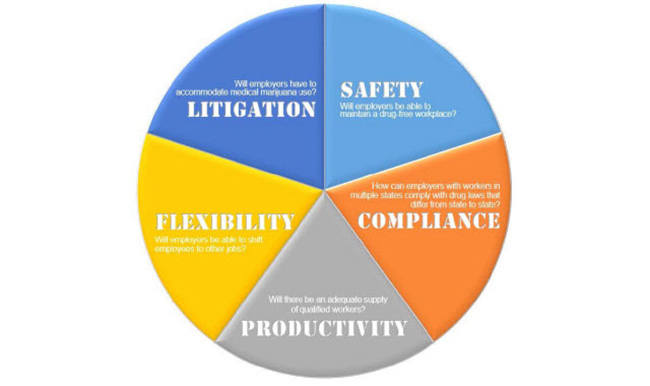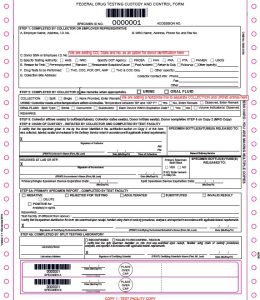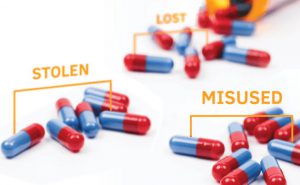 The Drug and Alcohol Testing Industry Association (DATIA) continues to closely follow marijuana legislation and how it impacts employers seeking to maintain drug-free workplaces. As part of its educational efforts, DATIA provides online resources to help address misconceptions about marijuana by presenting clear facts to employers.
The Drug and Alcohol Testing Industry Association (DATIA) continues to closely follow marijuana legislation and how it impacts employers seeking to maintain drug-free workplaces. As part of its educational efforts, DATIA provides online resources to help address misconceptions about marijuana by presenting clear facts to employers.
A collaboration by experts like Sue Rusche, co-founder of National Families in Action, and Kevin Sabet, Ph. D., co-founder of Project SAM (Smart Approaches to Marijuana), yielded a robust whitepaper – What Will Legal Marijuana Cost Employers – in an effort to examine “the complexities that employers face as marijuana is legalized for medical or recreational use in various U.S. states and how the changing legal landscape will affect employers.”
The authors examine five key areas for employers that are affected by marijuana use – litigation, productivity, safety, flexibility and compliance – along with easy-to-understand scenarios that could potentially occur in any business. Lastly, the whitepaper provides suggestions regarding what employers can do to help to protect their workplaces.
Litigation
Will employers have to accommodate marijuana use? Will employers pay unemployment compensation to an employee fired for failing a drug test? Can employers terminate an employee for engaging in legal activities off-the-clock? The whitepaper addresses questions like these, citing several recent legal cases and reminding employers that marijuana is illegal under federal law regardless of individual state legislation.
Productivity
As the most widely used illicit drug in the United States, marijuana has been linked to reduced motivation among workers as well as increased absenteeism, tardiness, injuries and on-the-job accidents. Data shows that the risk for addiction climbs to 1 in 6 for young users and impacts the adolescent brain. As such, “the more available marijuana becomes through legalization and commercialization, the more adolescents and young adults will access and use it.” The authors remind us that today’s adolescents are tomorrow’s workforce.
Safety
Drug testing in the workplace grew in response to a mounting number of drug and alcohol related accidents in the 1980s. Employers wanted to help to ensure safer working conditions, especially for employees with safety-sensitive roles like transportation. A review of 20 years of marijuana research confirmed that driving after smoking marijuana doubles the risk of an automobile accident. Nationally, marijuana remains the second most cited drug involved accidents after alcohol. The authors say that the best course for employers to maintain a drug-free workplace is a zero-tolerance policy.
Flexibility
“One of the steepest challenges for organizations to overcome is the recruitment and retention of a talented, skilled workforce,” said the authors. Marijuana endangers the balance between provisions on the employer side and on the employee side. One example is the “Prohibition of Pre-Employment Marijuana Testing Emergency Act of 2014” bill passed by the Washington, D.C. City Council that prohibits employers from drug testing an employee before a conditional job offer has been extended. Once hired, the job candidate, now new employee, must adhere to the employer’s substance abuse policy. Drug testing programs aim to filter out drug users and deter drug use in the workplace. Compared to the costs and risks that hiring a drug user can introduce to the workplace, the costs associated with a drug testing program are rather minimal.
Compliance
Employers with a workforce in multiple states are challenged to comply with marijuana laws that differ from state to state. A standard, comprehensive substance abuse policy that complies with relevant federal and state laws is critical. Always consult an attorney because this can be complex when employee protections vary by state. Marijuana remains classified as a Schedule I drug under federal law, a fact that all drug free workplace policies share regardless of the individual state.
What Employers Can Do
In conclusion, the whitepaper authors suggest that employers should stay informed about fluctuating marijuana state legislation as well as the varying forms of marijuana in products like edibles, teas and tonics. Take action by joining local or state anti-drug groups and coalitions, participate in marijuana-prevention activities and monitor the latest marijuana news and resources. Experts also encourage employers to challenge the notion that marijuana is safe or a medicine, both of which are misguided myths.
Download the What Will Legal Marijuana Cost Employers whitepaper.
For more information about drug testing, visit our website.
 Your Privacy Choices
|
Privacy Notices
|
Terms
|
Language Assistance / Non-Discrimination Notice | Asistencia de Idiomas / Aviso de no Discriminación | 語言協助 / 不䈚視通知
Your Privacy Choices
|
Privacy Notices
|
Terms
|
Language Assistance / Non-Discrimination Notice | Asistencia de Idiomas / Aviso de no Discriminación | 語言協助 / 不䈚視通知



















A collaboration by experts like Sue Rusche, co-founder of National Families in Action, and Kevin Sabet, Ph. D., co-founder of Project SAM (Smart Approaches to Marijuana), yielded a robust whitepaper – What Will Legal Marijuana Cost Employers – in an effort to examine “the complexities that employers face as marijuana is legalized for medical or recreational use in various U.S. states and how the changing legal landscape will affect employers.”
The authors examine five key areas for employers that are affected by marijuana use – litigation, productivity, safety, flexibility and compliance – along with easy-to-understand scenarios that could potentially occur in any business. Lastly, the whitepaper provides suggestions regarding what employers can do to help to protect their workplaces.
Litigation
Will employers have to accommodate marijuana use? Will employers pay unemployment compensation to an employee fired for failing a drug test? Can employers terminate an employee for engaging in legal activities off-the-clock? The whitepaper addresses questions like these, citing several recent legal cases and reminding employers that marijuana is illegal under federal law regardless of individual state legislation.
Productivity
As the most widely used illicit drug in the United States, marijuana has been linked to reduced motivation among workers as well as increased absenteeism, tardiness, injuries and on-the-job accidents. Data shows that the risk for addiction climbs to 1 in 6 for young users and impacts the adolescent brain. As such, “the more available marijuana becomes through legalization and commercialization, the more adolescents and young adults will access and use it.” The authors remind us that today’s adolescents are tomorrow’s workforce.
Safety
Drug testing in the workplace grew in response to a mounting number of drug and alcohol related accidents in the 1980s. Employers wanted to help to ensure safer working conditions, especially for employees with safety-sensitive roles like transportation. A review of 20 years of marijuana research confirmed that driving after smoking marijuana doubles the risk of an automobile accident. Nationally, marijuana remains the second most cited drug involved accidents after alcohol. The authors say that the best course for employers to maintain a drug-free workplace is a zero-tolerance policy.
Flexibility
“One of the steepest challenges for organizations to overcome is the recruitment and retention of a talented, skilled workforce,” said the authors. Marijuana endangers the balance between provisions on the employer side and on the employee side. One example is the “Prohibition of Pre-Employment Marijuana Testing Emergency Act of 2014” bill passed by the Washington, D.C. City Council that prohibits employers from drug testing an employee before a conditional job offer has been extended. Once hired, the job candidate, now new employee, must adhere to the employer’s substance abuse policy. Drug testing programs aim to filter out drug users and deter drug use in the workplace. Compared to the costs and risks that hiring a drug user can introduce to the workplace, the costs associated with a drug testing program are rather minimal.
Compliance
Employers with a workforce in multiple states are challenged to comply with marijuana laws that differ from state to state. A standard, comprehensive substance abuse policy that complies with relevant federal and state laws is critical. Always consult an attorney because this can be complex when employee protections vary by state. Marijuana remains classified as a Schedule I drug under federal law, a fact that all drug free workplace policies share regardless of the individual state.
What Employers Can Do
In conclusion, the whitepaper authors suggest that employers should stay informed about fluctuating marijuana state legislation as well as the varying forms of marijuana in products like edibles, teas and tonics. Take action by joining local or state anti-drug groups and coalitions, participate in marijuana-prevention activities and monitor the latest marijuana news and resources. Experts also encourage employers to challenge the notion that marijuana is safe or a medicine, both of which are misguided myths.
Download the What Will Legal Marijuana Cost Employers whitepaper.
For more information about drug testing, visit our website.